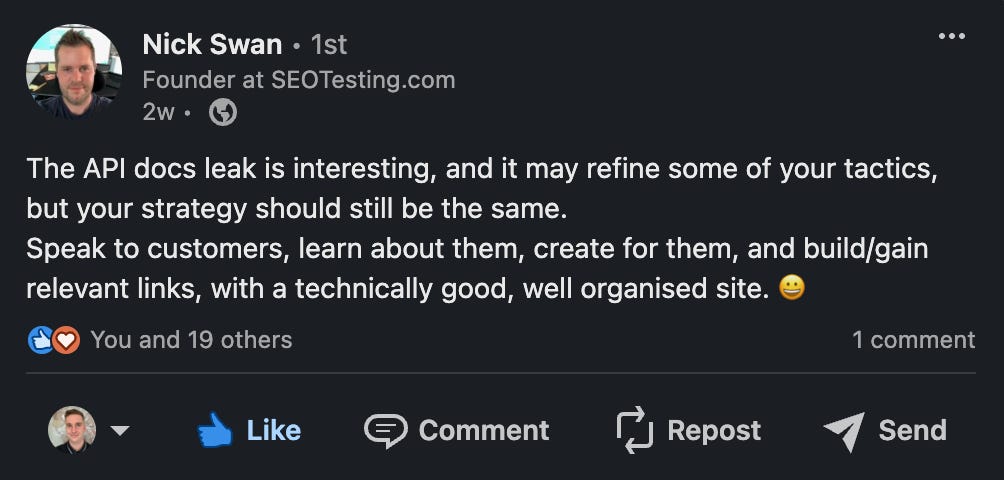SEO is like... Investing?
How does SEO compare to investing your money? Well, it's a lot similar than you might think.
So, like many “twenty-somethings” out there, I am currently doing my best to save for various reasons. Nice holidays, maybe a new car, building up my emergency fund. All that good stuff. I’m also investing in various index funds.
It got me thinking.
I’m a Revolut customer. One of my favourite features within the app is the ‘round-up’ feature, and you’re probably familiar with this with your own banking/saving app. Every time you make a purchase, the app rounds up the amount to the nearest pound (or dollar) and transfers the difference into a savings/investment account of your choice. It’s a small, almost imperceptible action that, over time, builds up into a substantial amount. This feature encourages consistent, incremental savings & investment without you even noticing.
SEO: The Slow & Steady Builder
SEO works in a remarkably similar way. When you create content for your website, you might not see an immediate surge in clicks or traffic. However, just like those tiny investment contributions, each piece of content adds up. Over time, as your content matures and gains more and more authority (cough, cough, and links too), you’ll start to see a steady increase in organic traffic. This traffic growth might seem slow at first, but it compounds over time, leading to significant results.
The proof? This is exactly what we’ve seen with SEOTesting:
The Power of Patience and Consistency
One of the most challenging aspects of SEO is the patience it requires. Trust me, I know. It’s easy to get disheartened when your efforts don’t yield immediate results. However, understanding the SEO Compound Effect can help you stay motivated.
Each blog post, each little optimisation you make, each SEO test you do, and each backlink, is like a small deposit into your SEO account. With consistency, these deposits grow and multiply, much like compound interest in your savings account.
Practical Tips to Leverage the SEO Compound Effect
Consistent Content Creation: Regularly publish high-quality, relevant content. Each piece contributes to your overall SEO strategy.
Keyword Optimisation: Ensure your content is optimised for the right keywords to attract your target audience.
Backlink Acquisition: Focus on acquiring quality backlinks from reputable sources to boost your site's authority.
Monitor and Adjust: Regularly review your SEO performance and make necessary adjustments to keep your strategy on track.
Is it really that easy? Yes, generally. A recent LinkedIn post from Nick Swan, SEOTesting’s founder, sums it up perfectly in my opinion:
The above echo my thoughts exactly, and that’s not just because he’s my boss! 😂
Speak to all of your customers.
Listen to your leads, too.
Learn about them.
Create content for them.
Build/Gain relevant links to that content.
Ensure your site is technically sound.
Do that, you can’t go far wrong.
What About Core Update Hits?
We’ve all been hit by them… We have to address it…
Think of a core update as a financial crash in the SEO world. Just as a sudden market downturn can drastically reduce the value of your investments, a core update can significantly impact your site’s rankings and traffic.
Core updates are, generally, designed to improve search results, but they can sometimes cause a sharp decline in your site’s performance. Sites affected by these updates may experience a sudden drop in traffic, similar to watching your savings take a hit during a market downturn.
Rebuilding After a Crash
While a core update hit can feel devastating, it’s not the end. Here are some steps to rebuild and bounce back:
Analyse the Impact: Understand which pages and keywords were most affected. Use tools like like GA4, GSC, Ahrefs, SEOTesting, etc to help with this.
Quality Over Quantity: Focus on improving the quality of your content. Ensure it’s relevant, valuable, and aligns with the latest SEO best practices.
User Experience: Where possible, try and improve the experience users are having on your website. GA4 can help you highlight pages with a high drop-off rate, or a low engagement rate, which can help you find the pages that need the most immediate improvement.
Earn Trust: Build credibility with high-quality backlinks and authoritative content. Show search engines that your site is a trusted resource. Yes, backlinks still matter.
Let’s take another look at SEOTesting’s traffic graph I shared earlier:
Each of the red marks you see below the graph indicate some form of Google update. That could be a core update, spam update, etc etc. As you can see, some of them meant we saw a traffic decline.
Did we let that stop us? No. We addressed what needed addressing, and we kept doing what was working. And look where we are now! :D
Take a look at the FTSE 100 Index, look similar?
Final Thoughts
SEO is a long-term game. Just like and investing money, it requires dedication, consistency, and a bit of patience. But, as with the round-up savings feature, those small, consistent efforts will compound over time, leading to substantial growth in your organic traffic.
Embrace the SEO Compound Effect, and watch your website traffic grow steadily and significantly. Trying to find those instant spikes is completely unsustainable. And remember, every piece of content is an investment into your site’s future success.
And if a core update shakes your rankings, approach it like a financial crash—analyse, adapt, and rebuild. Your patience and strategic adjustments will pay off in the long run.
Until next time, keep pushing forward and watch those clicks add up!







